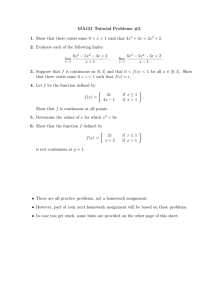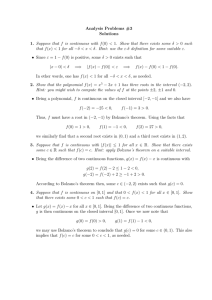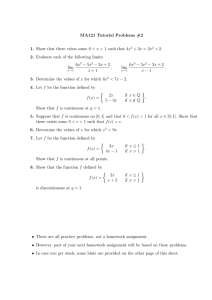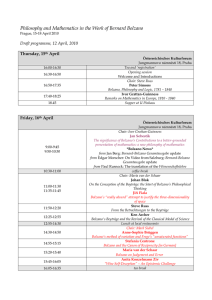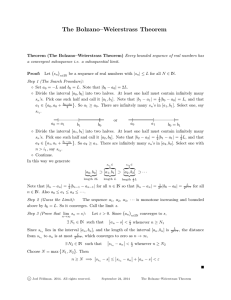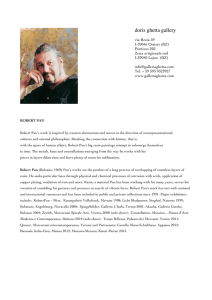Begründungen
advertisement
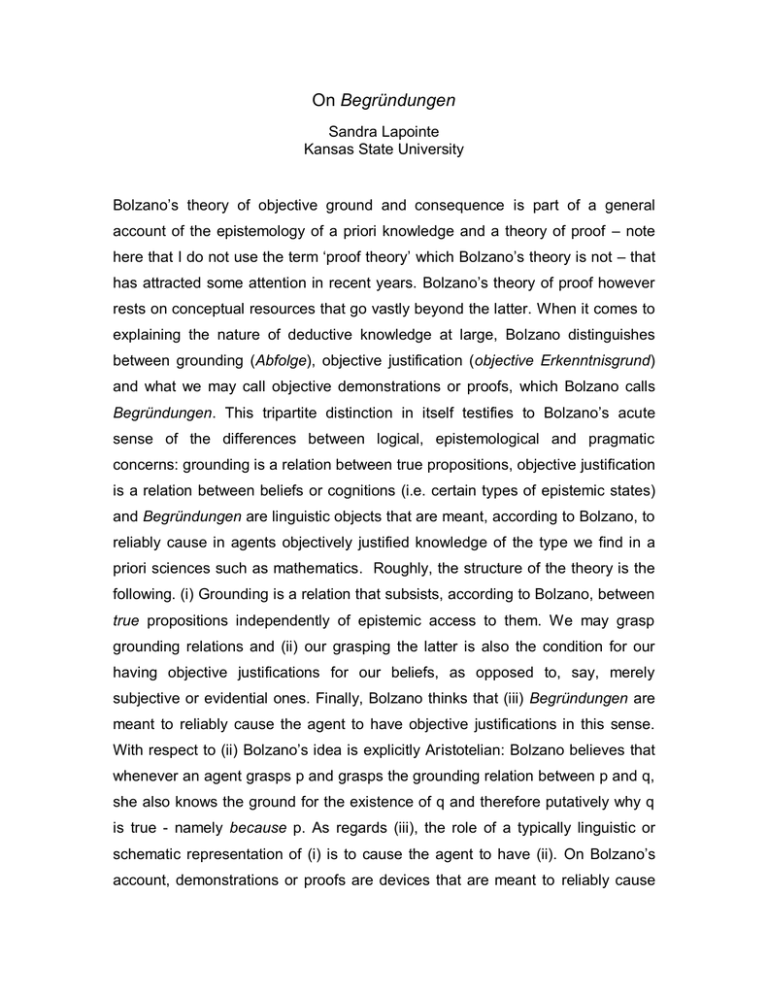
On Begründungen Sandra Lapointe Kansas State University Bolzano‟s theory of objective ground and consequence is part of a general account of the epistemology of a priori knowledge and a theory of proof – note here that I do not use the term „proof theory‟ which Bolzano‟s theory is not – that has attracted some attention in recent years. Bolzano‟s theory of proof however rests on conceptual resources that go vastly beyond the latter. When it comes to explaining the nature of deductive knowledge at large, Bolzano distinguishes between grounding (Abfolge), objective justification (objective Erkenntnisgrund) and what we may call objective demonstrations or proofs, which Bolzano calls Begründungen. This tripartite distinction in itself testifies to Bolzano‟s acute sense of the differences between logical, epistemological and pragmatic concerns: grounding is a relation between true propositions, objective justification is a relation between beliefs or cognitions (i.e. certain types of epistemic states) and Begründungen are linguistic objects that are meant, according to Bolzano, to reliably cause in agents objectively justified knowledge of the type we find in a priori sciences such as mathematics. Roughly, the structure of the theory is the following. (i) Grounding is a relation that subsists, according to Bolzano, between true propositions independently of epistemic access to them. We may grasp grounding relations and (ii) our grasping the latter is also the condition for our having objective justifications for our beliefs, as opposed to, say, merely subjective or evidential ones. Finally, Bolzano thinks that (iii) Begründungen are meant to reliably cause the agent to have objective justifications in this sense. With respect to (ii) Bolzano‟s idea is explicitly Aristotelian: Bolzano believes that whenever an agent grasps p and grasps the grounding relation between p and q, she also knows the ground for the existence of q and therefore putatively why q is true - namely because p. As regards (iii), the role of a typically linguistic or schematic representation of (i) is to cause the agent to have (ii). On Bolzano‟s account, demonstrations or proofs are devices that are meant to reliably cause us to have a justification for certain beliefs: a demonstration is (typically) the linguistic representation of a set of propositions in a given order or diagrammatic composition we may use in order to bring our interlocutor (or ourselves) to bestow confidence on the truth of a given proposition. Bolzano writes: I say that […] a set of sentences1 is a proof that belongs to M if these sentences present themselves with the determinate intention, or in fact are such as if they presented themselves thereat with the determinate intention to produce, in the mind of the reader, the judgement M with a a degree of certainty (Zuversicht) with which he would not have made it beforehand. (1837, §512, 237) In particular, Begründungen succeed in providing agents with an objective justification for their relevant beliefs because they make the objective ground of the propositions that form the content of these beliefs epistemically accessible to that agent - with the result that she should form the relevant true belief. Given what precedes, it would be incorrect to think that Bolzano conceives of a Begründung as the mere “subjective” grasping of a given grounding relation between true propositions. Confusion on this point may occur if objective justification and Begründungen are not sufficiently discriminated. When I stand in some cognitive attitude to the grounding relation between p and q, what I have according to Bolzano is an objective justification for the truth of p. But a Begründung is something different. Begründungen are ordered sets of – typically – written propositions that are used in science with the intention of bringing about or causing a belief in the mind of an agent – and organised in such a way that she will have reasons to credit this belief with a higher degree of confidence than she did before or that she would have been likely to do had the demonstration not been available. A Begründung of q is an epistemically accessible representation of q, its (complete) ground and the grounding relation between q and its ground that is such as to reliably cause the agent to believe that q with confidence and indeed, should lead her to be fully confident in its necessity since 1 The term Bolzano uses is „Satz’ but in the context he is referring to the kind of Sätze that can appear and hence to linguistic entities. she also putatively has insight into why it is (necessarily) true.2 The Begründung is not fool proof since whether I do acquire objective knowledge upon surveying the proof in question depends in part on my background knowledge, in part on my overall ability to process the relevant inferences. The latter according to Bolzano‟s theory of cognition is mostly function of my having been previously acquainted with many inferences of different types. The more accustomed I am to drawing inferences, the more reliably the Begründung is likely to cause in me the relevant objective justification. In order to stand occurrently (and not a merely dispositionally) in a cognitive attitude towards a given propositional content an agent must somehow be causally affected. Sure enough this may be brought about in many ways. As Bolzano sees it, beliefs and ideas arise in our mind most of the time in a more or less sophisticated, chaotic and spontaneous way, on the basis of mental associations and/or causal interactions with the world. (see, for instance, Bolzano 1837, §283 where Bolzano discusses the topic at length) The availability of a linguistic object that represents the grounding relation is meant to reliably cause objective knowledge, that is, to bring one‟s interlocutor to have occurent objective knowledge of a certain truth. But this may not be the best way to cause the given belief per se. It might be that in order to convince me of the truth of the intermediate value theorem, my interlocutor needs to resort to a more or less intuitive diagrammatic explanation, which is precisely what Begründungen seek to avoid. Given Bolzano‟s views on grounding and the role it plays in his account of objective knowledge, in order to have an objective justification for a proposition an agent must minimally be caused to recognise at least part of the deductive structure in which the propositions in question is related to its premises. This places strict constraints on mathematical demonstration. It would be wrong however to assume that Bolzano thought that mathematical knowledge can only be achieved via Begründungen. On Bolzano‟s account, I would still know that 2 + 2 For a qualification of this idea, see Bolzano (1837, §525, 261f; §527, 263f). 2 = 4 if the justification for my believing that 2 + 2 = 4 were that I‟ve been told so (under the assumption that we can acquire knowledge by testimony – I leave the question open) or that after putting 2 bottles of champagne in the fridge and then two more, I found that there were four. Begründungen are, in Bolzano, one type of demonstration, that is, one way to bring me to have a justification for one of my beliefs. But Begründungen are not the only type of demonstration in Bolzano‟s theory of knowledge, nor indeed the only bona fide one. There are two kinds of demonstrations in Bolzano‟s theory, that is, two general types of devices that are meant to reliably cause agents to acquire greater certainty in the truth of a given proposition. On the one hand there are those that reflect the objective deductive order and hence also provide an objective justification for a truth and, on the other hand, the panoply of those that don‟t reflect the order of grounding. Bolzano calls the latter Gewissmachungen or certifications. He writes: Until now, one has not always distinguished distinctly enough the objective ground of a truth from the subjective means through which [we gain it ] and it follows automatically that one could not distinguish Begründungen from mere certifications. Aristotle (Anal. Post. Book I, c.2 & 13) and the Schoolmen introduce a division between proofs that show only that (hoti), and other that also give the why (dioti) that something is in a very diligent manner but claim somewhat exaggeratedly that only the latter produce true cognition. (1837, §525, 262; my emphasis) When an agent is caused to know that something is true on the basis of a certification, the agent has a subjective – as opposed to an objective – justification for his belief. (Cf. 1837, §313, 232) Bolzano‟s theory of certification and subjective justification is an indispensible element of his account of empirical knowledge. He explains: Almost every demonstration should also be here [in the pure conceptual sciences and ethics] authentic Begründungen. In others, in particular in the empirical sciences, by contrast, in chemistry, medicine, history, etc., it is only rarely possible to derive the proof of a truth from it objective ground alone […] (1837, §525, 261) Certification are ubiquitous in empirical sciences such as medicine – medical diagnosis, for instance, relies on certifications in Bolzano‟s sense. Symptoms are typically visible effects – direct or indirect – of diseases that allow us to recognise them: when we rely on symptoms to identify a disease we thus never know this disease through its objective ground. The latter remark points to a crucial aspect of Bolzano‟s theory of certifications: if we follow Bolzano, it would seem that whenever the warrant we have for the truth of a proposition is not its objective ground, we would seem to acquire the conviction for the truth of the proposition that is demonstrated on the basis of one of its consequences. He explains that while my belief that it is warmer in the summer than in the winter is the objective justification for my belief that, all other things being equal, the thermometer is higher in the summer than in the winter, my belief that the thermometer is higher is, all other things being equal, the subjective warrant of my belief that it is warmer. Note – this is a case Bolzano does not however consider – that I may fail to form the belief that it is warm when the thermometer is high. This could be due to some defect of my background knowledge, say, I‟ve never seen a thermometer or, more relevantly perhaps, because of a cognitive shortcoming: I happen not to have formed the relevant connection between the two events. Note also that while it seems to be the case that at least some instances of subjective justification are the converse of a relation of objective justification, it would be wrong to assume that in order to recognise p on the basis of one of its objective consequence q I must also know that p grounds q. I may have formed the belief that when there is smoke there is fire without knowing that fire causes smoke – say I ignore everything about the phenomenon of combustion and I simply take the events to be co-occurrent. Likewise, my son may have formed the belief that whenever the light is on in the living room, the light is also on in the hallway, and the former may for him be a subjective justification for the latter (an vice versa, but not necessarily). But two events do not stand in a direct causal relation, they are merely related by their having a common cause of which he may have no knowledge, namely that they are on the same electric circuit. Given the nature of deductive disciplines as Bolzano conceives of them, i.e. arithmetic and geometry, for instance, it seems unlikely that I could cause my interlocutor to know (objectively) why, for instance, the sum of the internal angles are equal to that of two right otherwise than by providing him with a means to recognise the truth of the propositions from which it derives. But it is hard to imagine how I could cause my interlocutor to recognize the truth of the premises without the support of some intersubjective device and I am inclined to think that linguistic support is always required. One could defend the idea that strictly speaking an epistemically accessible linguistic representation of the grounding relation between p and q, while it may be useful, is not always required for the purpose of our having knowledge of q on the basis of its ground p. What causes me to know q on the basis of p is the knowledge of q and the knowledge of q‟s being grounded by p itself, and I may be in a position to acquire this knowledge independently of any available public artefact meant to cause that knowledge in me. But this amounts to arguing that I may acquire an objective justification in the absence of a Begründung and on this Bolzano would agree. The case is however different when it comes to proving objectively a given proposition, that is, when it comes to engaging precisely in the exercise of devising linguistic objects that are intended to cause agents to know given propositions with more certainty. In such cases, the endeavour is invariably both linguistic (by definition) and conceptual. Indeed it would not do to argue that my knowing that q on the basis of p may be non-conceptual and that objective justifications in sciences like mathematics do not systematically require conceptual support. Of course, I may ask myself, “why q?”, have an “insight” or make a guess and “invent” a theory that explains its truth and then realise that this theory indeed provides me with the actual ground for its truth. On Bolzano‟s view, however, the production of the objective justification, my establishing that p is the ground for q would still involve my grasping propositions that are eminently conceptual. The crucial point, I think, is that contrary to what is the case in empirical sciences that may involve nonconceptual cognitive states deductive practices, at least on Bolzano‟s account, exclude non-conceptual cognitions. By contrast, while certain types of certifications, for instance those we find in theoretical disciplines - e.g. my acquiring the belief that propositions are acausal by supposing the opposite and deriving a contradiction - are eminently based on linguistic and conceptual resources as well, other types appear to rest on pre-linguistic, pre-conceptual knowledge. In order for my belief that this is smoke to be a certification of my belief that there is also fire - as it should be - it seems unnecessary that there be a linguistic object, in addition to the state of affairs themselves, to cause me to have the relevant beliefs. Though Bolzano does not make this explicit in his discussion of certifications, other passages of the Theory of Sciences – for instance the passages where he discusses the role and nature of perceptions and experience – make it reasonable to assume that he would agree to say that what causes me to have the belief that there is smoke if we exclude the case in which I base my self on someone else‟s report is typically the smoke itself. (Cf. 1837, 300, 131) Assuming that for Bolzano, states of perceptions are predoxastic, then it would seem that subjective justification could in some cases be pre-doxastic. It seems reasonable to think that the availability of a Begründung is not always sufficient to cause an agent to have objective knowledge. And this is also Bolzano‟s view. But it also seems reasonable to think that in some cases the availability of a Begründung is not optimal for the purpose of causing an agent to acquire a determinate belief. While a Begründung is meant to cause objective knowledge of, say, the intermediate value theorem in a given situation of scientific exchange, it is not always the best way to bring someone to recognise the truth of a particular proposition. Upon surveying a Begründung I may fail to have the relevant beliefs: the proof might be too technical given my background knowledge of the topic or I may simply be unable to concentrate that morning. Likewise I may have gained epistemic access to the linguistic object thus acquiring the cognition that p and the cognition that p grounds q, but because of some epistemic shortcoming remain incapable of concluding to q, say, because the list of premises is so long that I can only ever grasp at once a subset of the premises required to draw the conclusion. One question that is likely to have arisen by now is whether mathematicians, in particular, should rely only on Begründungen and seek only to cause objective knowledge. Since the purpose of demonstrations is primarily to cause the interlocutor to have a higher degree of confidence in one of his beliefs, and that Bolzano emphasises the effectiveness of proofs over their providing objective justifications (see 1837, §§526-535), Begründungen should not be seen as the only canonical or scientifically acceptable means to bring an agent to bestow confidence on a judgement. If we follow (1837, §525), Bolzano is of the opinion that “almost every demonstration in the pure conceptual sciences should be authentic Begründungen” and therefore not all of them. It might be, for instance, that in order to convince my interlocutor of a given truth, the most effective means is to use a reductio – which for Bolzano does not provide us with an objective justification since, for one thing, the relation does not hold between truths as grounding requires but consists in deriving a contradiction from a falsehood. (Cf. 1837, §§329, 530) Besides, Bolzano warns us against the idea that one ought to use only logical or formal demonstrations who might end up boring the interlocutor to distraction and have a rather adverse epistemic effect. Although Bolzano claims that we ought to use Begründungen as often as possible, he also recognizes that we sometime have to take shortcuts or simply use heuristic creativity to cause our interlocutor to bestow confidence on the truths of mathematics, especially when they have only partial and scattered knowledge of the discipline. Nonetheless Begründungen remain a crucial part of Bolzano‟s epistemology of a priori knowledge. In the light of what precedes, I would like to suggest that the best way to approach Begründung is to consider it as a means to introduce pragmatic constraints on demonstration that are meant to steer actual demonstrative practices in deductive science and not as an adequacy condition for demonstrations per se. Seen in these terms, the idea that mathematical demonstrations “ought to” (in a practical sense, not in the sense of a necessary condition) reflect the grounding order would insure, in Bolzano‟s theory, two things. First it would insure that an agent does not deny that a proposition has an objective ground and is thus inferable from more primitive propositions every time this agent, perhaps owing to her medical condition or limited recognitional means, fails to recognise that the proposition has an objective ground. Consequently, it would insure that the demonstration procedure is not shortcircuited by criterion such as intuition, evidence or insight. The requirement that mathematical demonstrations be Begründungen forbids that the agent‟s inability to derive a proposition from more primitive ones be compensated by a non grounding-related feature. In this relation, Mancosu speaks of the heuristic fruitfulness of Bolzano‟s requirement on scientific exposition. (Mancosu 1999, 436) What is important is the following: although Bolzano considered that Begründungen should be favoured in mathematical demonstration and despite the fact that he thought that only Begründungen have the advantage of letting us understand why a given proposition is indeed true, he did not think that mathematical demonstrations ought to be Begründungen. This may seem odd but Bolzano has good reasons to avoid requiring that all our mathematical proofs provide us with objective (and if some interpretations of Bolzano are correct explanatory) knowledge. For one thing, asking that all mathematical proofs be Begründungen would not be a reasonable requirement and, in particular, it would not be one that is always epistemically realizable. Given the nature of grounding, it would often require us to engage in the production of linguistic objects that have immense proportions. On the other hand, Bolzano thinks that there are situation in which it is legitimate to accept, even within mathematics, proofs that deliver only evidential knowledge that something is true. Bolzano emphasizes the importance of pragmatic considerations in mathematical practice and the fact that when it comes to exposing a mathematical theory the main objective should be to cause the agent to have more confidence in the truth of the proposition to be demonstrated than he would have otherwise or even merely to incite him to look for an objective justification by himself. Hence, given certain circumstantial epistemic constraints, Bolzano is even willing to concede that certain proofs can be reduced to a brief justification of one‟s opinion : Since it is often the case that an intricate development of these grounds would take up too much place; since it is also often the case that in order to assess the latter previous knowledge is required of our reader, which we can‟t assume he has; since the nature of these grounds is sometimes such that they do not have in our own eyes a very high degree of reliability, we must in fact be excused if we often only indicate our opinion without entering into a complex discussion of its grounds. For even an opinion that is not accompanied by a demonstration and which only shows our opinion can sometimes be useful. All by itself, it will already prompt the reader to think further, and if the hint that we give him is not incorrect the discovery of truth will be considerably alleviated. (1837, §577, 387) Furthermore, and this would deserve to be investigated further, it is worth mentioning that Bolzano is not averse to reverting to purely evidential means, for instance, when it comes to mathematical demonstration: Besides, it is in no way absurd to accept, from time to time, in geometry as well as in the other mathematical disciplines, mere proofs of probability. Who will not recall those admirable theorems of the theory of prime number which Fermat managed to discover through experimentation and to make probable through examples. (Bolzano 1850, 183) Since they are merely probable, Bolzano does think that evidential proofs need to be supplemented by “decisive” ones. But there are various types of non evidential proofs that could fulfil that role and here Bolzano does not specify which types of proof are decisive. One could want to argue that the latter reduce to Begründungen. And indeed if, upon surveying an objective proof, I acquire an objective justification I cannot doubt the truth of the conclusion and it is therefore decisively true. But it is hard to imagine that Bolzano would have thought that my recognising the truth of a proposition on the basis of the linguistic representation of an inference from Ableitbarkeit would be any less decisive. Take, for instance: Triangles have two dimensions is ableitbar from Figures have two dimensions Triangles are figures Not only is the inference truth preserving, but the conclusion is also a conceptual truth – it is composed only of concepts - which, according to Bolzano, means that its negation would imply a contradiction and is therefore necessary (1837, §133, 37). Ableitbarkeit and grounding, in Bolzano‟s theory, both have the epistemic particularity of yielding an (inferred) propositional content that can be asserted or judged with confidence. As Bolzano sees it, confidence is a property of judgements that are indefeasible, that is, not liable to error (1837, §317, 264). The objective consequence of a set of a priori propositions cannot be defeated if only because, if I know its ground, I also know why it is true and necessarily so. Similarly, if p is true and if I know that q is ableitbar from p – and this holds a fortiori in the case in which p and q are conceptual truths – I have a warrant, namely the fact that Ableitbarkeit preserves truth from premises to conclusion, and I cannot be mistaken about the truth of q. Bolzano‟s methodology and didactics of scientific knowledge is based on a theory of logic that presents a number of semantic innovations. Commentators often favour interpretations that stress Bolzano‟s commitment to semantic realism and this is important: half a century before Frege he laid down a conception of philosophical logic that would inform a significant part of the theories for decades to come. The importance of Bolzano‟s contribution to semantics can hardly be overestimated. The same holds for his contribution to the theoretical basis of mathematical practice. Far from ignoring epistemic and pragmatic constraint, Bolzano discusses them in detail, thus providing a comprehensive basis for a theory of mathematical knowledge that was aimed at supporting work in the discipline. As a mathematician, Bolzano was attuned to philosophical concerns that escaped the attention of most of his contemporaries and many of his successors. His theory presents a historical interest and a philosophical one as well, and one that deserves to be investigated further.


